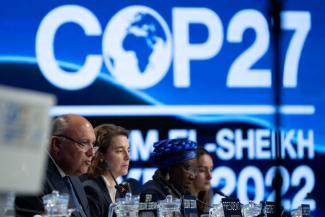Our view
UN climate summit in Egypt did not deliver on mitigation

Prosperous nations, which historically have caused most greenhouse gas emissions, are expected to pay, whereas poorer nations, which have hardly contributed to global heating, but suffer the worst impacts, will receive money to repair damages. Developing countries and emerging markets have been demanding such a fund for a long time (see Saleemul Huq on www.dandc.eu).
It will be set up quite late, however, as extreme weather is already wreaking havoc in many places. The floods submerging large parts of Pakistan this summer, for example, affected more than 33 million people, and the damages amount to a double-digit billion dollar sum (see Imran Mukhtar on www.dandc.eu).
The new fund is meant to enable fast and adequate responses to such calamities. Unfortunately, the scheme still is quite vague. Who will contribute how much, is an open question. China, currently the country with the most carbon emissions and historically the second runner behind the USA, does not want to pay. Western governments insist that the world’s most potent export power cannot keep hiding behind its traditional status as a developing country. Success will ultimately depend on China’s willingness to cooperate.
So far, burdens have not been shared fairly. High-income countries are still not living up to their old pledge to mobilise an annual $ 100 billion in support of climate mitigation and adaptation in low- and middle-income countries. Many disadvantaged countries, moreover, are heavily indebted, so they can hardly take new loans to respond to the climate crisis – and to the extent that they are still able to do so, such fiscal action will ensnare them more tightly in debt traps after every new drought or flood. It plainly does not make sense to discuss climate finance without considering debt problems (see Kathrin Berensmann on www.dandc.eu).
Prosperous nations must obviously bear responsibility for covering climate damages. It would be even more important, however, to put a brake on global heating. In this respect, the summit in Egypt was a failure, even though it reconfirmed the goal of the Paris Agreement concluded seven years ago to limit average temperature increases to 1.5°C. The problem is that humanity has not made significant progress on getting there.
That would require radical reductions in the use of fossil fuels. Sadly, the summit declaration only mentions the phasing down of coal, but not oil and gas. Opposition from fossil industries and major producing countries such as Saudi Arabia and Russia proved too strong. Moreover, there was a lack of nation states scaling up their climate commitments made so far.
Time is running out. The concentration of greenhouse gases in the atmosphere keeps growing. Scientists tell us that the policies currently in place will lead to a temperature rise of 2.8°C by the end of this century (see Suparna Banerjee on www.dandc.eu).
However, irreversible tipping points, such as the melting of Arctic and Antarctic ice, are likely to be crossed somewhere between 1.5°C and 2°C. As a result, climate damages would escalate far beyond what we have seen to date. To prevent the worst, cooperation of as many countries as possible, including the EU and the USA, is needed. They must scale up climate efforts fast, regardless of what is declared at global summits. The transition to renewable energy makes economic sense anyway. Never before has it been so cheap to generate solar and wind power. Moreover, the current energy crisis, which was triggered by Russia’s attack on Ukraine, proves how devastating the dependence on fossil imports from despotically ruled countries can be.
International cooperation is indispensable if humankind is to get a grip on the climate crisis. Nationalist egotism of the Russian kind must not be allowed to undermine it. How hot the planet will become by 2100, depends on whether such a transformative coalition of the willing succeeds. The credibility of the western governments depends on it too, by the way.
Jörg Döbereiner is a member of the editorial team of D+C Development and Cooperation / E+Z Entwicklung und Zusammenarbeit.
euz.editor@dandc.eu











